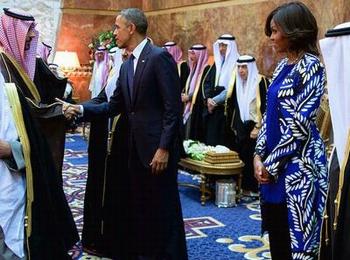
WASHINGTON, DC, May 11, 2015 (ENS) – King Salman bin Abdulaziz al-Saud of Saudi Arabia called President Barack Obama today to express his regret at not being able to travel to Washington this week for a meeting of the Arab States regional council.
The King confirmed that he was sending Crown Prince Mohammed bin Nayef and Deputy Crown Prince Mohammed bin Salman to represent the Kingdom at meetings the President is hosting at Camp David with member nations of the Cooperation Council for the Arab States of the Gulf, aka the Gulf Cooperation Council, or CGG.
Bahrain, Kuwait, Oman, Qatar, Saudi Arabia, and the United Arab Emirates are the GCC member states.

During their call today, President Obama and King Salman reviewed the agenda for the upcoming meetings and agreed on the need to work closely together and with other members of the Gulf Cooperation Council to build a “collective capacity” to be more effective in addressing the threats facing the region and resolving regional conflicts.
At a White House dinner Wednesday, and all-day talks at Camp David on Thursday, leaders will be discussing “what we can do together,” deputy national security adviser Ben Rhodes said in a conference call Monday with reporters.
“We’ll be discussing U.S. policies and our approaches, but also GCC policies and approaches, and how we can align those policies on areas of mutual interest,” Rhodes said.
A statement that reflects the common positions of the United States and the GCC on issues, particularly of regional security, is expected as the CGG Summit concludes.
The environmental implications of the summit are many. The overwhelming economic importance of oil and gas to the region makes Qatar and other GCC countries vulnerable to global efforts to reduce greenhouse gas emissions.
At the same time, climate change is expected to affect the environmental security of the GCC states, with their rising population levels. Water scarcity, food security and health issues are some of the likely consequences to this desert region.

Abdulaziz Al Saud (Photo courtesy Wikipedia)
The President and King Salman also discussed the importance of a comprehensive agreement between the P5+1 and Iran that “verifiably ensures the exclusively peaceful nature of Iran’s nuclear program,” the White House Press Secretary said in a statement.
The P5+1 is composed of the five permanent members of the UN Security Council: China, France, Russia, the United Kingdom, and the United States, plus one, Germany. Also called E3+3 in Europe, the P5+1 has been in negotiations with Iran regarding its nuclear program since 2006.
President Obama welcomed Saudi Arabia’s announcement of a cease-fire and humanitarian pause in Yemen. Both agreed on the need to address the urgent humanitarian situation in the country, the White House said.
The two leaders emphasized “the strength of the two countries’ partnership, based on their shared interest and commitment to the stability and prosperity of the region, and agreed to continue our close consultations on a wide range of issues.”
The Royal Embassy of Saudi Arabia in a statement put the King’s absence down to “the timing of the summit, the scheduled humanitarian ceasefire in Yemen and the opening of the King Salman Center for Humanitarian Aid.”
“I want to lay to rest this notion of this being a snub or a problem with the relationship,” said Saudi Foreign Minister Adel Al-Jubeir.
On May 7, Secretary of State John Kerry met with King Salman in the Saudi capital Riyadh to prepare for the GCC Summit and to discuss a ceasefire in Yemen.
The next day in Paris the Saudi Foreign Minister Al Jubeir called a five-day ceasefire beginning Tuesday in Yemen to allow distribution of humanitarian aid.
The Embassy of Bahrain confirmed Monday that King Hamad bin Isa Al Khalifa will not be attending the summit either. Bahrain will be represented by Crown Prince Salman bin Hamad Al Khalifa.
Copyright Environment News Service (ENS) 2015. All rights reserved.
© 2015, Environment News Service. All rights reserved. Content may be quoted only with proper attribution and a direct link to the original article. Full reproduction is prohibited.
